Related Research Articles

An ecosystem is a system that environments and their organisms form through their interaction. The biotic and abiotic components are linked together through nutrient cycles and energy flows.
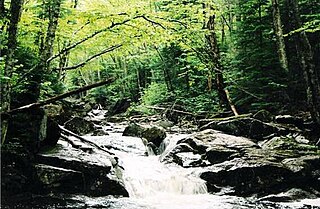
Ecosystem ecology is the integrated study of living (biotic) and non-living (abiotic) components of ecosystems and their interactions within an ecosystem framework. This science examines how ecosystems work and relates this to their components such as chemicals,bedrock,soil,plants,and animals.
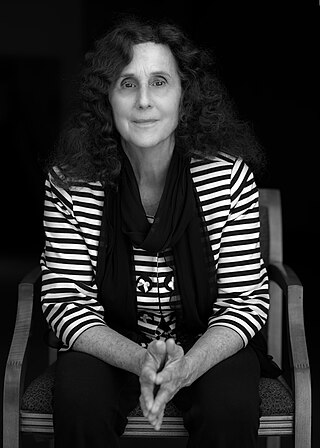
Pamela Jane Bjorkman NAS,AAAS is an American biochemist and molecular biologist. She is the David Baltimore Professor of Biology and Biological Engineering at the California Institute of Technology (Caltech). Her research centers on the study of the three-dimensional structures of proteins related to Class I MHC,or Major Histocompatibility Complex,proteins of the immune system,and proteins involved in the immune responses to viruses. Bjorkman's goal is to improve current therapeutic applications. Bjorkman is most well known as a pioneer in the field of structural biology.
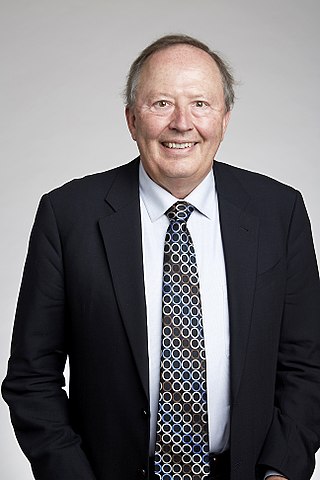
George David Tilman,ForMemRS,is an American ecologist. He is Regents Professor and McKnight Presidential Chair in Ecology at the University of Minnesota,as well as an instructor in Conservation Biology;Ecology,Evolution,and Behavior;and Microbial Ecology. He is director of the Cedar Creek Ecosystem Science Reserve long-term ecological research station. Tilman is also a professor at University of California,Santa Barbara's Bren School of Environmental Science &Management.

Myrica faya is a species of Myrica,native to Macaronesia,and possibly also western coastal mainland Portugal.
F. Stuart Chapin III is a professor of Ecology at the Department of Biology and Wildlife of the Institute of Arctic Biology,University of Alaska. He was President of the Ecological Society of America (ESA) from August 2010 until 2011.
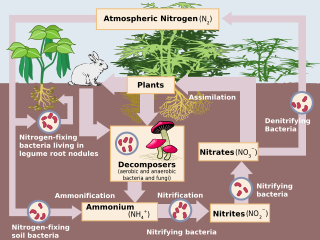
Human impact on the nitrogen cycle is diverse. Agricultural and industrial nitrogen (N) inputs to the environment currently exceed inputs from natural N fixation. As a consequence of anthropogenic inputs,the global nitrogen cycle (Fig. 1) has been significantly altered over the past century. Global atmospheric nitrous oxide (N2O) mole fractions have increased from a pre-industrial value of ~270 nmol/mol to ~319 nmol/mol in 2005. Human activities account for over one-third of N2O emissions,most of which are due to the agricultural sector. This article is intended to give a brief review of the history of anthropogenic N inputs,and reported impacts of nitrogen inputs on selected terrestrial and aquatic ecosystems.
Pamela Anne Matson is an American scientist and professor. From 2002 - 2017 she was the dean of the Stanford University School of Earth,Energy &Environmental Sciences. She also previously worked at NASA and at the University of California,Berkeley. Matson is the Richard and Rhoda Goldman Professor of Environmental Studies (Emerita) at the Stanford Doerr School of Sustainability and a Senior Fellow (Emerita) at the Stanford Woods Institute for the Environment. Matson is a winner of the prestigious MacArthur Fellowship,also known as the "genius grant," and is considered to be a "pioneer in the field of environmental science." She was appointed to the "Einstein Professorship" of the Chinese Academy of Sciences in 2011. She received an honorary doctorate from McGill University in 2017. She is married to fellow scientist Peter Vitousek.
David William Schindler,,was an American/Canadian limnologist. He held the Killam Memorial Chair and was Professor of Ecology in the Department of Biological Sciences at the University of Alberta in Edmonton,Alberta. He was notable for "innovative large-scale experiments" on whole lakes at the Experimental Lakes Area (ELA) which proved that "phosphorus controls the eutrophication in temperate lakes leading to the banning of phosphates in detergents. He was also known for his research on acid rain. In 1989,Schindler moved from the ELA to continue his research at the University of Alberta in Edmonton,with studies into fresh water shortages and the effects of climate disruption on Canada's alpine and northern boreal ecosystems. Schindler's research had earned him numerous national and international awards,including the Gerhard Herzberg Gold Medal,the First Stockholm Water Prize (1991) the Volvo Environment Prize (1998),and the Tyler Prize for Environmental Achievement (2006).

Stephen Russell Carpenter is an American lake ecologist who focuses on lake eutrophication which is the over-enrichment of lake ecosystems leading to toxic blooms of micro-organisms and fish kills.

Gretchen C. Daily is an American environmental scientist and tropical ecologist. She has contributed to understanding humanity's dependence and impacts on nature,and to advancing a systematic approach for valuing nature in policy,finance,management,and practice around the world. Daily is co-founder and faculty director of the Natural Capital Project,a global partnership that aims to mainstream the values of nature into decision-making of people,governments,investors,corporations,NGOs,and other institutions. Together with more than 300 partners worldwide,the Project is pioneering science,technology,and scalable demonstrations of inclusive,sustainable development.
Sarah E. Hobbie is an American ecologist,currently at the University of Minnesota,a National Academy of Sciences Fellow for Ecology,Evolution and Behavior in 2014 and a formerly Minnesota McKnight Land-Grant Professor.
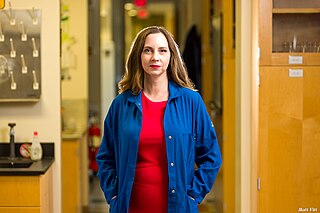
Kathleen Kay Treseder is an American ecologist who specializes in the interplay between global climate change and fungal ecology. She also serves as a member of the Irvine City Council after being elected to the position in 2022. She is currently a professor in the Department of Ecology and Evolutionary Biology at the University of California,Irvine. She is a Fellow of the American Association for the Advancement of Science,the American Academy of Microbiology,and the Ecological Society of America.

Sharon J. Hall is an ecosystem ecologist and associate professor at the School of Life Sciences at Arizona State University. Her research focuses on ecosystem ecology and the ways that human activity interacts with the environment.
Nancy B. Grimm is an American ecosystem ecologist and professor at Arizona State University. Grimm's substantial contributions to the understanding of urban and arid ecosystem biogeochemistry are recognized in her numerous awards. Grimm is an elected Fellow of the American Geophysical Union,Ecological Society of America,and the American Association for the Advancement of Science.
Pamela H. Templer is an ecosystem ecologist and professor at Boston University who focuses on plant-microbial interaction and their effect on carbon exchange and nutrient cycling. She is also interested in examining how urban ecosystems function,how human actions influence nutrient cycling,atmosphere-biosphere interactions,and other ecosystem processes.
Christine Goodale is an ecosystem ecologist and an Associate Professor in the Department of Ecology and Evolutionary Biology at Cornell University. Goodale conducts research that studies the cycling of water,carbon,nitrogen and other nutrients through forest ecosystems.
Elvira Cuevas Viera is a Puerto Rican ecologist. She is a professor in the department of biology at University of Puerto Rico,Río Piedras Campus where she serves as director of the Center for Applied Tropical Ecology and Conservation.
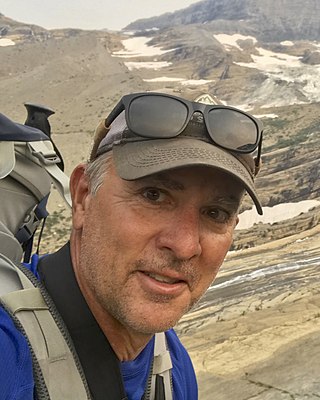
James Elser is an American ecologist and limnologist. He is Director &Bierman Professor of Ecology,Flathead Lake Biological Station,University of Montana and research professor,School of Life Sciences,Arizona State University. He is known for his work in ecological stoichiometry. In 2019,he was elected to the National Academy of Sciences.
Michelle Cailin Mack is an ecologist working on the connections between plants and climate in polar regions. She is a fellow of the Ecological Society of America and the American Geophysical Union. She currently holds the title of Regent's Professor at Northern Arizona University.
References
- ↑ "Peter M. Vitousek, Ph.D."
- 1 2 "Peter Vitousek, Ph.D. (USA)" (PDF). Retrieved 2024-07-03.
- ↑ "Vitousek, Peter". National Academy of Sciences. Retrieved May 19, 2011.
- ↑ "Book of Members, 1780-2010: Chapter V" (PDF). American Academy of Arts and Sciences. Retrieved May 18, 2011.
- ↑ "NAS Award for Scientific Reviewing". National Academy of Sciences. Archived from the original on March 18, 2011. Retrieved May 19, 2011.
- ↑ "The 2010 Japan Prize Awarded to Japanese and US Scientists" (PDF). Japan Prize. Retrieved May 19, 2011.
- ↑ "Peter Vitousek '67: Eco Champion". Punahou School. Archived from the original on 2016-12-30. Retrieved 2017-01-03.